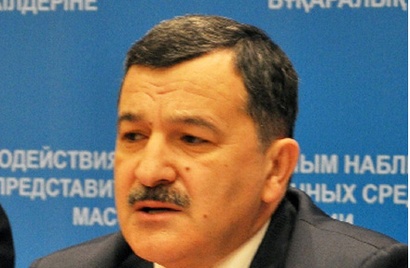Armenia’s occupation policy harms country itself

By Sara Rajabova
A delay in the negotiation process on the settlement of the long-standing Armenian-Azerbaijani Nagorno-Karabakh conflict remains a hindrance to regional development and a big threat to regional peace and security.
Though negotiations are underway to settle the two decade-old problem, no tangible results have been achieved so far.
“Today a slowdown is observed in the negotiations,” said Aydin Mirzazade, MP and deputy chairman of Parliamentary Security and Defense Committee, while commenting on the current status of the peace talks to settle the Nagorno-Karabakh conflict.
“Society can not even remember the date of the most recent meeting in between the Azerbaijani and Armenian presidents,” he said pointing to slowdown of the talks.
For over two decades, Azerbaijan and Armenia have been locked in a conflict which emerged over Armenia's territorial claims against its South Caucasus neighbor. Since, a war in the early 1990s saw the Armenian armed forces occupy 20 percent of Azerbaijan's territory, including Nagorno-Karabakh and seven surrounding regions.
Peace talks, mediated by Russia, France and the U.S. through the OSCE Minsk Group, are underway on the basis of a peace outline proposed by the Minsk Group co-chairs and dubbed the Madrid Principles. The negotiations have been largely fruitless so far.
However, Mirzazade noted, the process to resolve the problem did not stop. “The process is ongoing. The new situation in 2015 is very different from the situation 21 years ago,” he told AzerNews.
Then Azerbaijan was involved in a war right after gaining independence in the early 1990s, Mirzazade said noting that the country had been unable to establish normal statehood and revive its economy.
However, over the past years, the successful policy pursued by national leader Heydar Aliyev and now by President Ilham Aliyev has strengthened Azerbaijan’s just position in the Nagorno-Karabakh conflict, he said.
Since 1994, Armenia is not a dictating country and doesn’t hold the key word on the arena, according to the MP.
“Armenia’s continuing occupation policy, first of all, has hit the country itself. Thus, the country's population is running abroad, economy has declined and the army is in poor condition,” Mirzazade said.
He went on to say that all these factors make Azerbaijan’s word more decisive. “Today, the international community holds a more objective approach towards Azerbaijan.”
Mirzazade believes all this certainly brings the decades-old problem’s solution even closer.
The MP further noted that Azerbaijan doesn’t see the settlement of the conflict only in the meeting of the two countries’ presidents, saying: “Bilateral meetings, the co-chairs’ meetings and discussion of issues related to the resolution of the problem within the international organizations can also be considered among factors that can seriously affect the settlement of the conflict.”
Armenia continues its occupation in defiance of four UN Security Council resolutions calling for an immediate and unconditional withdrawal of Armenian armed forces from Azerbaijan’s occupied territories.
Commenting on the recent Eastern Partnership Summit held in Riga on May 21-22 and its final declaration, Mirzazade noted with regret that the relations with Eastern Partnership countries were established on the same condition, rules and principles without taking into account the specific features of these countries.
He stressed that this had caused dissatisfaction of some countries, as well as Azerbaijan.
“A one-sided approach was observed towards the Nagorno-Karabakh conflict in the final document. No efforts have been demonstrated toward the resolution of this conflict and it didn’t mention violation of Azerbaijan's territorial integrity,” Mirzazade said.
There is no more important issue for Azerbaijan, as an independent state and authoritative country in the world community, than the Nagorno-Karabakh conflict.
Earlier Azerbaijani Foreign Minister, Elmar Mammadyarov said Azerbaijan insisted on pointing in the Riga declaration’s document the four UN Security Council resolutions, which clearly stipulate the demands for Armenia to withdraw troops from Azerbaijan’s occupied territories.
Though Azerbaijan had serious claims against this document, the country made concessions to the EU and agreed to approve the declaration by stating that the country will clarify its special position on the declaration.
--
Sara Rajabova is AzerNews’ staff journalist, follow her on
Twitter: @SaraRajabova
Follow us on Twitter @AzerNewsAz
